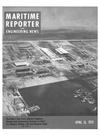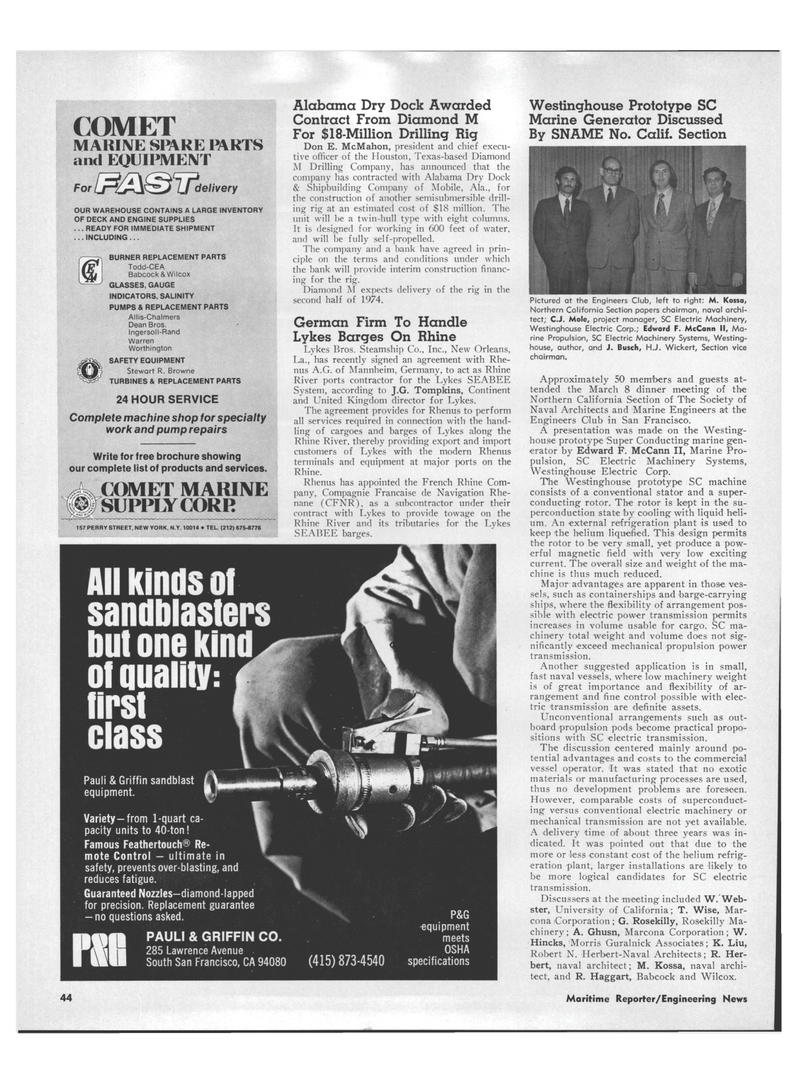
Page 42: of Maritime Reporter Magazine (April 15, 1973)
Read this page in Pdf, Flash or Html5 edition of April 15, 1973 Maritime Reporter Magazine
COMET
MARINE SPAKE PARTS and EQUIPMENT
OUR WAREHOUSE CONTAINS A LARGE INVENTORY
OF DECK AND ENGINE SUPPLIES ... READY FOR IMMEDIATE SHIPMENT ... INCLUDING ...
BURNER REPLACEMENT PARTS
Todd-CEA
Babcock& Wilcox
GLASSES, GAUGE
INDICATORS, SALINITY
PUMPS & REPLACEMENT PARTS
Allis-Chalmers
Dean Bros.
Ingersoll-Rand
Warren
Worthington
SAFETY EQUIPMENT
Stewart R. Browne
TURBINES & REPLACEMENT PARTS 24 HOUR SERVICE
Complete machine shop for specialty work and pump repairs
Write for free brochure showing our complete list of products and services.
COMET MARINE SUPPLY CORR 157 PERRY STREET, NEW YORK. N.Y. 10014 • TEL. (212) 675-8776
Alabama Dry Dock Awarded
Contract From Diamond M
For $18-Million Drilling Rig
Don E. McMahon, president and chief execu- tive officer of the Houston, Texas-based Diamond
M Drilling Company, has announced that the company has contracted with Alabama Dry Dock & Shipbuilding Company of Mobile, Ala., for the construction of another semisubmersible drill- ing- rig at an estimated cost of $18 million. The. unit will be a twin-hull type with eight columns.
It is designed for working in 600 feet of water, and will be fully self-propelled.
The company and a bank have agreed in prin- ciple on the terms and conditions under which the bank will provide interim construction financ- ing for the rig.
Diamond M expects delivery of the rig in the second half of 1974.
German Firm To Handle
Lykes Barges On Rhine
Lykes Bros. Steamship Co., Inc., New Orleans,
La., has recently signed an agreement with Rhe- nus A.G. of Mannheim, Germany, to act as Rhine
River ports contractor for the Lykes SEABEE
System, according to J.G. Tompkins, Continent and United Kingdom director for Lykes.
The agreement provides for Rhenus to perform all services required in connection with the hand- ling of cargoes and barges of Lykes along the
Rhine River, thereby providing export and import customers of Lykes with the modern Rhenus terminals and equipment at major ports on the
Rhine.
Rhenus has appointed the French Rhine Com- pany, Compagnie Francaise de Navigation Rhe- nane (CFNR), as a subcontractor under their contract with Lykes to provide towage on the
Rhine River and its tributaries for the Lykes
SEABEE barges.
Pauli & Griffin sandblast equipment. I' i 1 \ " % > \
Variety-from 1-quart ca- pacity units to 40-ton!
Famous Feathertouch® Re- mote Control - ultimate in safety, prevents over-blasting, and reduces fatigue.
Guaranteed Nozzles-diamond-lapped for precision. Replacement guarantee - no questions asked. P&G equipment
PAULI & GRIFFIN CO. meets 285 Lawrence Avenue OSHA
South San Francisco, CA 94080 (415) 873-4540 specifications
Westinghouse Prototype SC
Marine Generator Discussed
By SNAME No. Calif. Section 4 fit hfe tf " rt f
Pictured at the Engineers Club, left to right: M. Kossa,
Northern California Section papers chairman, naval archi- tect; C.J. Mole, project manager, SC Electric Machinery,
Westinghouse Electric Corp.; Edward F. McCann II, Ma- rine Propulsion, SC Electric Machinery Systems, Westing- house, author, and J. Busch, H.J. Wickert, Section vice chairman.
Approximately 50 members and guests at- tended the March 8 dinner meeting of the
Northern California Section of The Society of
Naval Architects and Marine Engineers at the
Engineers Club in San Francisco.
A presentation was made on the Westing- house prototype Super Conducting marine gen- erator by Edward F. McCann II, Marine Pro- pulsion, SC Electric Machinery Systems,
Westinghouse Electric Corp.
The Westinghouse prototype SC machine consists of a conventional stator and a super- conducting rotor. The rotor is kept in the su- perconduction state by cooling with liquid heli- um. An external refrigeration plant is used to keep the helium liquefied. This design permits the rotor to be very small, yet produce a pow- erful magnetic field with very low exciting current. The overall size and weight of the ma- chine is thus much reduced.
Major advantages are apparent in those ves- sels, such as containerships and barge-carrying ships, where the flexibility of arrangement pos- sible with electric power transmission permits increases in volume usable for cargo. SC ma- chinery total weight and volume does not sig- nificantly exceed mechanical propulsion power transmission.
Another suggested application is in small, fast naval vessels, where low machinery weight is of great importance and flexibility of ar- rangement and fine control possible with elec- tric transmission are definite assets.
Unconventional arrangements such as out- board propulsion pods become practical propo- sitions with SC electric transmission.
The discussion centered mainly around po- tential advantages and costs to the commercial vessel operator. It was stated that no exotic materials or manufacturing processes are used, thus no development problems are foreseen.
However, comparable costs of superconduct- ing versus conventional electric machinery or mechanical transmission are not yet available.
A delivery time of about three years was in- dicated. It was pointed out that due to the more or less constant cost of the helium refrig- eration plant, larger installations are likely to be more logical candidates for SC electric transmission.
Discussers at the meeting included W. Web- ster, University of California; T. Wise, Mar- cona Corporation; G. Rosekilly, Rosekilly Ma- chinery ; A. Ghusn, Marcona Corporation; W.
Hincks, Morris Guralnick Associates; K. Liu,
Robert N. Herbert-Naval Architects; R. Her- bert, naval architect; M. Kossa, naval archi- tect, and R. Haggart, Babcock and Wilcox. 44 Maritime Reporter/Engineering News

 41
41

 43
43
